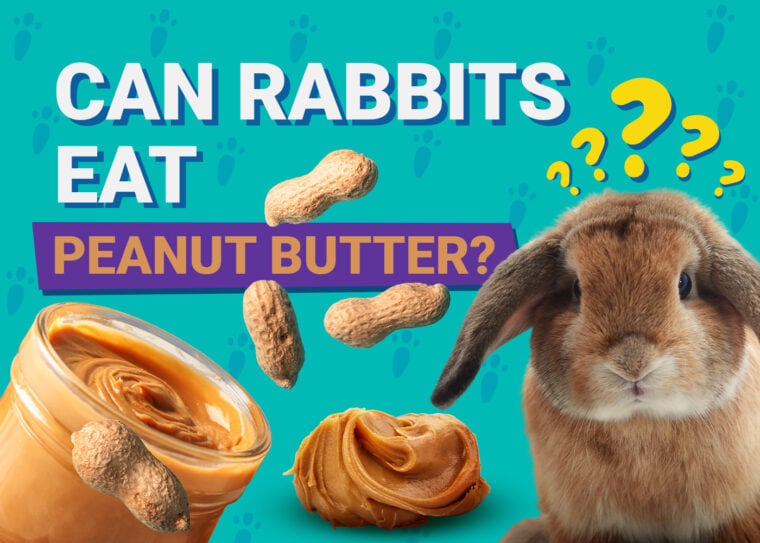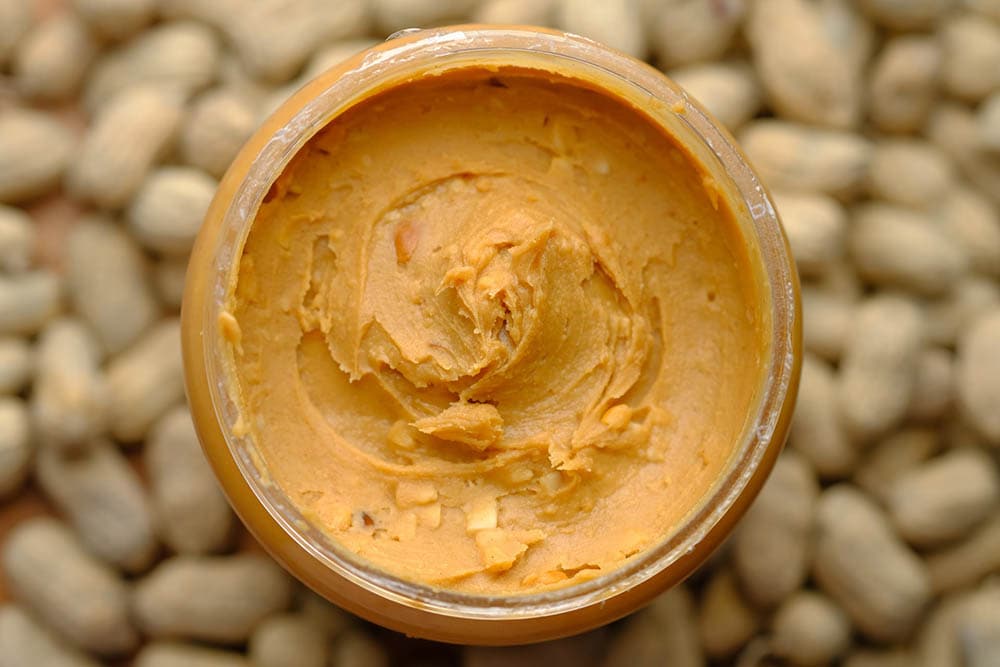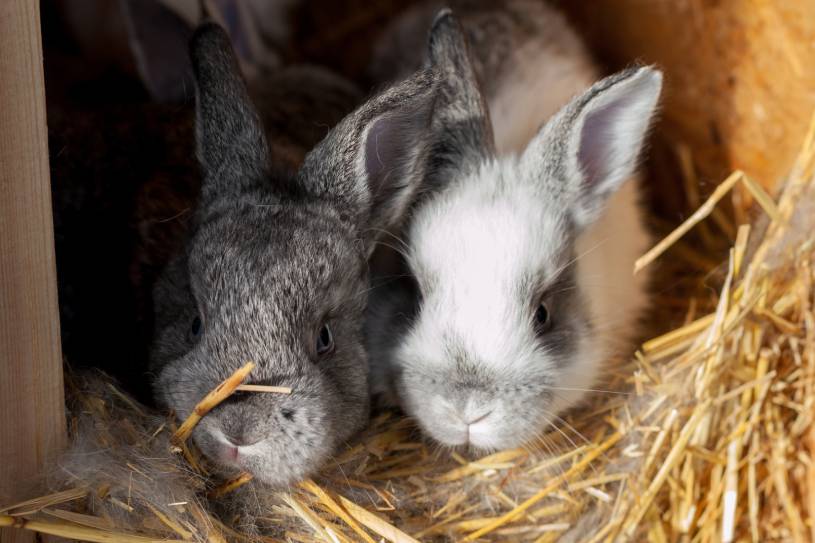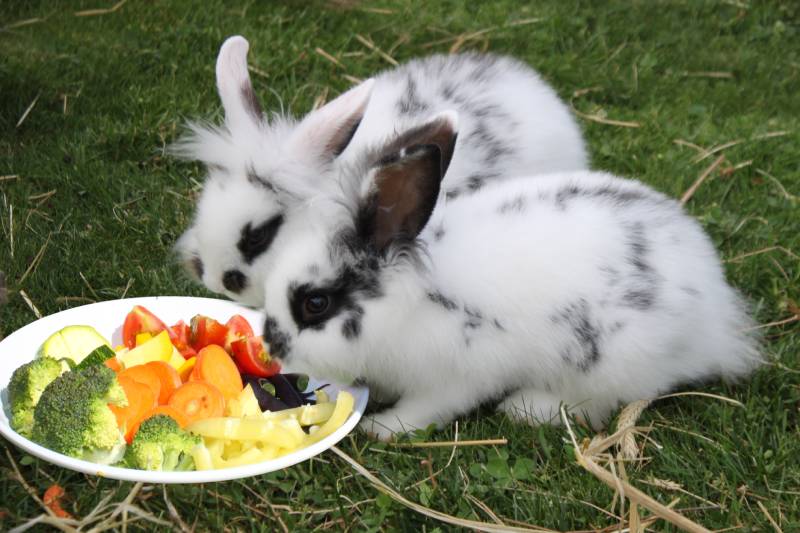
You may know how much dogs love a few licks of peanut butter every now and then. This tasty spread can be given as a treat or smeared inside a Kong toy to keep your dog occupied. However, the same isn’t true for rabbits, and giving peanut butter to them will only have negative effects on their little bodies.
In this article, we’ll discuss why peanut butter is bad for rabbits, what other foods should be avoided, and what alternatives can be given instead.
Why Is Peanut Butter Bad for Rabbits?

Peanut butter, although delicious to people, is unsafe to give to rabbits. Their daily diet should consist of good-quality hay, pellets, and vegetables. Therefore, a rabbit’s body wasn’t designed to consume or break down processed foods. Peanut butter offers no nutritional value to rabbits.
Some rabbits seem to enjoy the taste of peanut butter, but even small quantities aren’t recommended. Instead, offer them a healthier treat that they enjoy.
The high fat, sugar, salt, and caloric content in peanut butter can cause immediate and long-term consequences to their health. The high-fat content may lead to diarrhea and dehydration. The high-calorie content may lead to obesity. The high sugar content may lead to gastrointestinal issues and bad gut bacteria, and the high salt content may lead to other health complications.
Peanuts, in their natural and unprocessed form, are also bad for rabbits. Many people think that nuts and seeds are part of a rabbit’s diet, but this is not the case. They cause digestive issues and are a potential choking hazard.
If a food doesn’t benefit your rabbit’s health, keep it out of their diet.
Other Foods You Shouldn’t Feed Your Rabbit
Most people grow up with cats and dogs and discerning what they can and cannot consume usually comes quite naturally. However, a rabbit is very different from both of those pets and has entirely different nutritional needs.
Foods that have been processed or are high in carbohydrates, sugars, fats, and salts should be avoided. Before offering your rabbit a treat or snack that differs from their usual diet, you should read through the list of foods they should avoid.

Alternatives to Peanut Butter
If you’re looking for an alternative treat option to peanut butter, your only options are in the form of fruits, vegetables, or treats specifically made for rabbits.
Instead of a spoon of butter, you can offer your rabbit another household food, such as:
How Often Should a Rabbit Be Fed?

Rabbits should always have good-quality hay and water available at all times. They munch and drink throughout the day when they feel hungry or thirsty. The amount of hay you provide them with will depend on the size of their body. Rabbits don’t have an urge to consume all their food in one sitting, as some dogs do, so you don’t need to have set mealtimes for them.
Hay has most of the nutrition and fiber a rabbit needs to live a long and healthy life. It fuels their bodies and naturally wears down their long teeth, which is good for them. The type of hay you choose for your rabbit will depend on their age, size, and health.
Fruits and vegetables (mostly vegetables) provide your rabbit with the other nutrients they need. They should be given in moderation each morning and evening. Try to give your rabbit a variety of leafy greens as it’ll keep them occupied and prevent boredom.
Remember, rabbits are very different from humans and are happy to eat the same hay every day as it’s beneficial to them.
Are There Rabbit Treats?

There are treats specifically made for rabbits. However, the best treats for them are vegetables and a bit of fruit. Flowers, herbs, pellets, and dried fruit are other fun treats that rabbits can have in moderation.
Two tablespoons of treats are all that your rabbit requires per day, but it’s perfectly fine to skip a few days too. Too much sugar, which is found in fruits, can lead to gastrointestinal upset and can make your rabbit’s stomach feel sore and uncomfortable.
Rabbits enjoy foraging for food and will do it for hours. You can keep them entertained by hiding their treats around their enclosure and under their bedding. You can even place a few treats in a ball.
Bored rabbits will overeat, so try to keep their minds and bodies active as much as possible. Overeating can lead to obesity and other serious health problems.
Conclusion
Rabbits should not eat peanut butter, even in small quantities, as it causes gastrointestinal issues and can leave them feeling very uncomfortable. Along with peanut butter, rabbits shouldn’t be fed a wide range of processed and unprocessed foods. Anything with dairy or a high content of fats, sugar, and salt should be avoided because their little bodies cannot digest it well. Other types of foods, such as avocado, are toxic to rabbits and may even be deadly.
However, there are many foods that you can offer your rabbit for a bit of variety to keep them entertained. But, their main diet should always consist of good quality hay.







